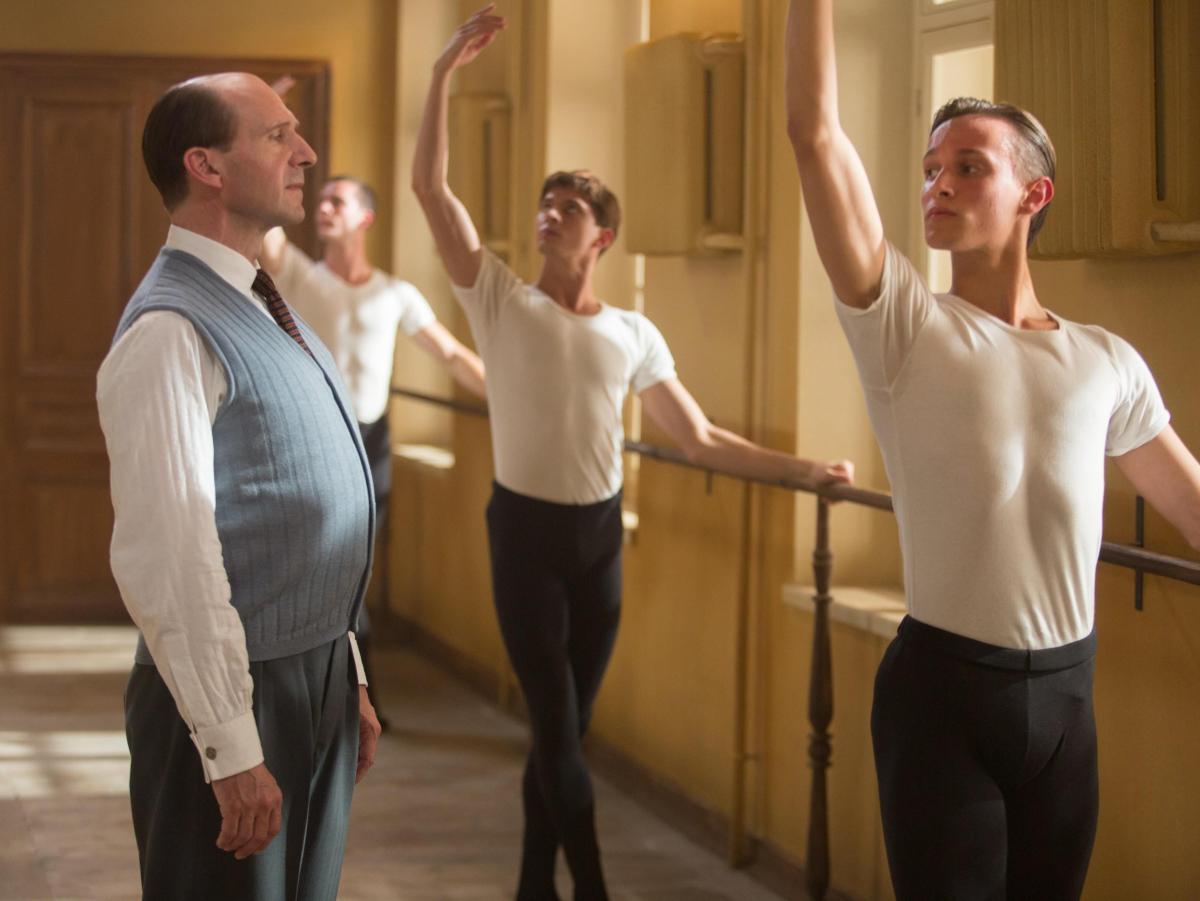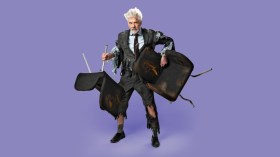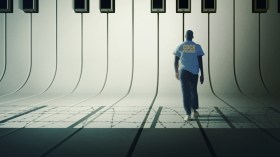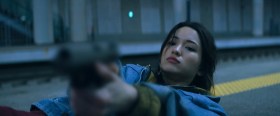Image: Ralph Fiennes, Oleg Ivenko and Louis Hofmann in The White Crow. Source: UPI.
Born aboard the Trans-Siberian Express train in 1938, legendary Soviet ballet dancer Rudolf Nureyev had a restless, liminal spirit that, by 1961, would provoke him to cross another border – from the USSR to the West. The White Crow follows Nureyev, played by Ukrainian dancer and first-time actor Oleg Ivenko, over five weeks of the Kirov Ballet’s fateful tour to Paris, and culminates in a dramatic standoff in the airport where 22-year-old Nureyev decides to defect.
The film takes its title from a Russian idiom for a nonconformist. So, while his fellow Soviet dancers stick together, Nureyev roams Paris alone, revels in its culture, and makes new friends. At an official reception, he literally crosses the room to introduce himself to French dancer Pierre Lacotte (Raphaël Personnaz), who in turn introduces Nureyev to Chilean-French socialite Clara Saint (Adèle Exarchopoulos). Both proved pivotal in helping him seek asylum.
The titular misfit’s mentor, ballet master Alexander Pushkin (Ralph Fiennes), describes Nureyev’s defection poetically as “an explosion of character”: something provoked not by politics, but by the dancer’s essential self. This explicitly evokes the perennial problem of the creative biopic genre: how to depict both the sublime spectacle of creative performance and the essentially interior ‘character’ that impels it.
Mediocre creative biopics seek to resolve this conundrum by showing other characters reacting to the protagonist’s genius, while stodgy, hostile institutions try and fail to hold back the protagonist’s radicalism. Weak creative biopics also seek to ‘diagnose’ creativity as an expression of deep-seated emotional trauma, either from childhood or doomed love. But what I liked about The White Crow was that Rudolf Nureyev’s biography offers many such ‘preconditions’ for genius, but the film refuses to attribute his artistry – or his notorious arrogance and thin-skinned tantrums – directly to shame over his poverty-stricken provincial origins, or to a homosexual identity that was repressed by the Soviets.
Nor does the film dwell on what precisely audiences found so special about Nureyev’s dancing. The White Crow does contain dance sequences that are viscerally filmed, and especially satisfying because they’re performed by actual dancers, who require no judicious editing or stunt doubles. Indeed, Sergei Polunin – himself a bad boy of ballet who was the subject of the 2016 documentary Dancer – plays Nureyev’s fellow Kirov dancer and Paris roommate Yuri Soloviev; as Rudi explains to Clara, “He’s even better than me.”
Yet it’s the beautiful, lithe Ivenko, untrained as an actor and reportedly unable to speak English before he made this film, who fascinates the frame with his pouting opacity. David Hare’s screenplay only occasionally succumbs to blurry ideas that Nureyev’s imperfect technique, acquired at the relatively late age of 17, made ugliness look, y’know, beautiful. The White Crow is on stronger ground when it seeks to notice, as its characters do; and as director, Ralph Fiennes mirrors his character Pushkin’s gently observational pedagogy.
Abandoning both linear chronology and a cause-and-effect flashback structure, the story weaves between three timelines: bleak, colour-leached childhood scenes that play like outtakes from a Tarkovsky film; memories of 1950s Leningrad, at the Vaganova Academy and then the Kirov Ballet; and the 1961 scenes in Paris. Fiennes uses shared emotions and motifs to link past and present, seeking to express not only the way we experience memory, but also Nureyev’s fundamentally liminal, forward-impelled subjectivity. He was always happy to leave behind the person he’d been, along with the people who made him that way… but The White Crow powerfully suggests that an appetite for appreciating art as well as performing it shaped Nureyev’s fluid self.
This isn’t fashionable right now, when identity is understood to drive art – not the other way around. Some critics have felt The White Crow ‘straightwashes’ its queer protagonist because of his intimate friendship with Clara, and because when he moves in with Pushkin and his wife Xenia (Chulpan Khamatova) to recuperate from a broken leg, her maternal attentions swiftly become sexual. (“This was always going to happen,” she tells the supine, half-willing youth.)
This erotic power dynamic was central to Nureyev’s famous dance partnerships with older women: at the Kirov, with Natalia Dudinskaya (Anna Urban); and after his defection, with the English ballerina Margot Fonteyn. And the film also shows his interest in men: he flirts frankly in Paris, and in Leningrad he learns English from an East German lover, fellow dance student Teja Kremke (Louis Hofmann).
Chastised by an arts apparatchik (Nadezhda Markina) for refusing to “give back” to the state that had sponsored his training, Nureyev is shown to take, take, take from every sensory and aesthetic experience, funnelling everything into perfecting his mastery of dance. It’s exciting to see him so fascinated by Géricault’s painting The Raft of the Medusa and Rembrandt’s Return of the Prodigal Son, so keen for museums and monuments, so drawn to dinner-table conversation.
There’s a certain familiar, Cold War-thriller quality to the scenes in which KGB agent Strizhevsky (Aleksei Morozov) watches Nureyev’s Parisian activities with jovial menace. But The White Crow, whose dialogue shifts easily between Russian, French and English (in character, Fiennes speaks only Russian), resists depicting the USSR in cartoonishly repressive Western clichés. Nureyev thrives under the rules and discipline of the Soviet system; and young Russians are shown to be like him in their zest for art and intellectual debate, and their optimism about the future.
However, the film effectively shows why a personality like Nureyev’s could not tolerate self-abnegation for a collective national purpose. Nureyev’s self was his purpose; and only by crossing that final political threshold at the Paris airport could this singular bird truly take wing.
4 stars ★★★★
The White Crow
Director: Ralph Fiennes
United Kingdom, 2019, 2hr 7min
Distributor: Universal
Rated: M
Release date: 18 July 2019
Actors:
Director:
Format:
Country:
Release:





